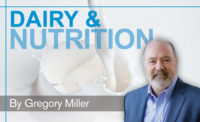Dairy’s established nutrition legacy and its commitment to responsible production are longtime pillars of sustainable food systems. But how often do we factor the affordability of nutritious dairy products into the equation?
The Food and Agriculture Organization (FAO) of the United Nations defines a “sustainable diet” as an eating pattern that supports health and has minimal environmental impact. It must be socially acceptable, culturally appropriate and — notably — economically feasible.
Dairy checks these boxes. However, I would argue that the “economically feasible” aspect isn’t a regular part of the dialogue, though it should be. Much of the discussion centers on dietary changes related to greenhouse gas emissions.
The FAO underscores the need to act as a global dairy entity. After all, we’re responsible for the care of one planet, and many countries share similar nutrition, health and economic challenges. National Dairy Council (NDC) is among the U.S. dairy groups reaching beyond our borders to understand the complex issues of sustainable food systems.
NDC participates in — through dairy farmers’ checkoff dollars — the Global Dairy Platform (GDP). I serve as global dairy sector lead for nutritional security for GDP, which works to build evidence on dairy’s role in sustainable food systems. GDP membership includes 95 dairy cooperatives, companies, associations, scientific bodies and other partners with operations in over 150 countries.
In 2016, the United Nations’ Committee on World Food Security requested a high-level panel of experts prepare a report on nutrition and food systems. My participation in the global nutrition dialogue through GDP led me to be among the experts chosen to write the report for the committee. I was the only representative from the food and agriculture private sector.
My NDC colleagues also formed a network of dairy dietitians, and NDC convened a series of “Nourish Dialogue Dinners” in the United States with leaders from the food industry. Through both avenues, dairy’s role as an affordable source of nutrition is emphasized as part of its contributions to sustainable food systems.
NDC’s leadership in research provides the science-based foundation for dairy’s role in sustainable food systems. Here is an overview of recent research:
- A recent study (https://bit.ly/330Qipi) found the dairy food group is the most affordable source of calcium and vitamin D.
- Another recent study (https://bit.ly/334LsaG) looked at the cost of eating the recommended healthy eating patterns of the Dietary Guidelines for Americans. It found the most affordable was the Healthy Vegetarian eating style, which includes three daily servings of dairy.
- A modeling study (https://bit.ly/305g6P2) showed that if people ate the recommended three daily servings of dairy, health care costs could potentially be reduced by almost $12.5 billion.
There is growing rhetoric in support of reducing consumption of animal-based foods in the interest of addressing environmental concerns. However, recommendations such as this do not consider the impacts on the other facets of sustainability.
All foods have an environmental impact, but making recommendations based primarily on this impact does not account for how these recommendations may affect nutritional status, health benefits and — just as important — the diet’s affordability. We must consider a balance across multiples domains to truly advance sustainable food systems.



